Tech Industry Challenges: The technology sector is experiencing unprecedented transformation as we progress through 2025. From artificial intelligence implementation hurdles to escalating cybersecurity threats, tech companies face a complex landscape of challenges that demand strategic navigation.
This comprehensive guide explores the most critical obstacles shaping the industry this year and provides actionable insights for overcoming them.
1. AI Implementation and Integration Challenges
Artificial intelligence continues to dominate technology discussions, but the reality of implementation remains fraught with difficulties. Many organizations face challenges like data quality and siloed initiatives when attempting to deploy AI effectively across their operations.

The journey from AI experimentation to production deployment reveals significant gaps between expectations and reality. While 85% of organizations have AI initiatives underway, only 25% have successfully scaled AI solutions across their enterprise operations. This disconnect stems from underestimating the complexity of AI integration with existing business processes and infrastructure.
The primary obstacles include:
Data Quality and Accessibility: Organizations struggle with inconsistent, incomplete, or poorly structured data that hampers AI model training and performance. Legacy systems often store data in formats incompatible with modern AI applications. Data silos prevent comprehensive model training, while poor data governance leads to biased or unreliable AI outcomes.
Skills Gap and Talent Shortage: The demand for AI specialists far exceeds supply, creating fierce competition for qualified professionals and driving up costs significantly. Beyond technical skills, organizations lack professionals who understand both AI capabilities and business domain expertise.
ROI Measurement Difficulties: Companies find it challenging to quantify the return on investment from AI initiatives, particularly when benefits are realized over extended periods or through indirect improvements. Traditional ROI metrics often fail to capture AI’s transformative impact on business processes and customer experiences.
Organizational Resistance: High hopes for generative AI hit some turbulence due to frustrations over the technology’s complexities and the organizational challenges of using it, highlighting the human factor in AI adoption. Change management becomes critical as employees fear job displacement and resist new workflows.
Ethical and Bias Concerns: AI models can perpetuate or amplify existing biases present in training data, leading to unfair outcomes in hiring, lending, and other critical decisions. Organizations must implement robust testing and monitoring systems to ensure AI fairness and transparency.
Integration Complexity: Connecting AI systems with existing enterprise software creates technical debt and maintenance challenges. APIs, data formats, and system architectures often require significant modification to accommodate AI workflows.
Regulatory Compliance: Emerging AI regulations require organizations to implement governance frameworks, audit trails, and explainable AI capabilities that add complexity to deployment timelines.
2. Cybersecurity Threats and Defense Evolution
Cybersecurity remains the most pressing concern for technology companies in 2025. Escalating cybersecurity threats, geopolitical tensions, and sustainability considerations will likely shape technology strategies, according to industry analysts.

The cybersecurity landscape has evolved dramatically, with threat actors becoming more sophisticated and persistent. Traditional perimeter-based security models prove inadequate against modern attack vectors that leverage AI, social engineering, and zero-day exploits. Organizations now face a complex threat matrix where human error, system vulnerabilities, and advanced persistent threats converge to create unprecedented risk scenarios.
AI-Powered Cyber Attacks: Cyber attackers are increasingly using artificial intelligence to create adaptive, scalable threats such as advanced malware and automated phishing attempts. These sophisticated attacks can evolve in real-time, making traditional defense mechanisms less effective. Machine learning algorithms enable attackers to customize attacks based on target behavior patterns and automate reconnaissance activities.
Nation-State Actors: Nation-state actors, including Russia’s Sandworm and China’s APT 41, will dominate global cybersecurity concerns in 2025, with tactics evolving in complexity and stealth. These groups are adopting commercial tools, making attribution more difficult. State-sponsored attacks target critical infrastructure, intellectual property, and democratic institutions with unprecedented sophistication.
Workforce Shortage: A cybersecurity workforce gap of nearly 4.8 million professionals continues to plague the industry, leaving organizations vulnerable due to understaffing. The shortage affects incident response times, threat detection capabilities, and security program implementation across all industry sectors.
Shadow AI Risks: CISOs will face growing challenges in managing “shadow AI,” the unsanctioned deployment of generative AI tools by employees, creating governance headaches and data security risks. Employees bypass official AI tools, potentially exposing sensitive data to unauthorized third-party services.
Supply Chain Security: Third-party vendor compromises represent a growing attack vector, as threat actors target suppliers to gain access to multiple downstream organizations. Software supply chain attacks have increased by 300% over the past year.
Ransomware Evolution: Ransomware groups are adopting double and triple extortion tactics, combining data encryption with data theft and DDoS attacks. Recovery costs now average $4.45 million per incident, including downtime and reputation damage.
IoT Vulnerabilities: The proliferation of Internet of Things devices creates millions of potential entry points for cybercriminals. Many IoT devices lack basic security features and receive infrequent security updates.
3. Supply Chain Disruptions and Dependencies
The tech industry’s complex global supply chain continues to face significant disruptions. Supply chain delays, labor shortages, and regulatory friction around grid access and permitting are slowing deployments, affecting everything from hardware manufacturing to software deployment.
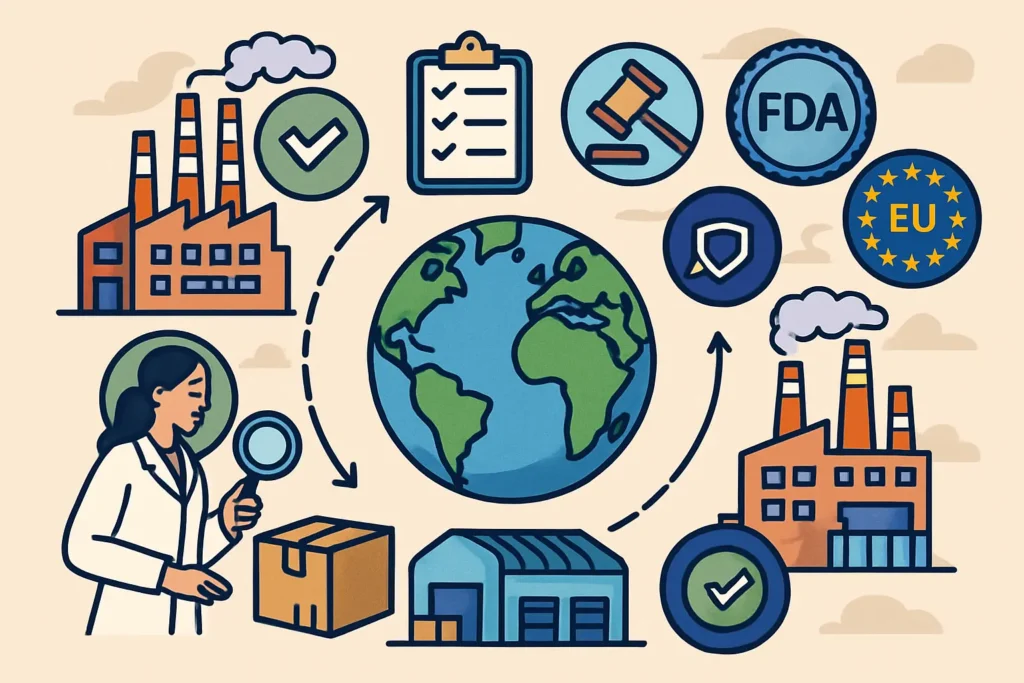
Key supply chain challenges include:
- Semiconductor Shortages: Ongoing chip shortages impact device manufacturing and deployment schedules
- Geopolitical Tensions: Trade restrictions and sanctions complicate international partnerships and sourcing
- Raw Material Scarcity: Critical materials for advanced technologies face supply constraints
- Logistics Complexity: Transportation and distribution networks remain strained
4. Regulatory Compliance and Governance
The regulatory landscape for technology companies has become increasingly complex, with new requirements emerging across multiple jurisdictions. Governments worldwide are racing to implement comprehensive technology governance frameworks while companies struggle to maintain compliance across conflicting regulatory requirements.

The regulatory landscape for technology companies has become increasingly complex, with new requirements emerging across multiple jurisdictions:
AI Governance Frameworks: Governments worldwide are implementing AI regulation, requiring companies to ensure transparency, fairness, and accountability in their AI systems.
Data Privacy Laws: GDPR, CCPA, and similar regulations continue evolving, requiring constant adaptation of data handling practices.
Cross-Border Compliance: Operating globally means navigating multiple regulatory frameworks simultaneously, often with conflicting requirements.
Reporting and Transparency: Increased demands for corporate transparency in areas like environmental impact, diversity, and algorithmic decision-making.
5. Talent Acquisition and Retention Crisis
The technology sector faces an acute talent shortage across multiple disciplines. The rapid evolution of technology requirements has created a skills gap that traditional education systems struggle to address, while competition for qualified professionals intensifies across industries embracing digital transformation.
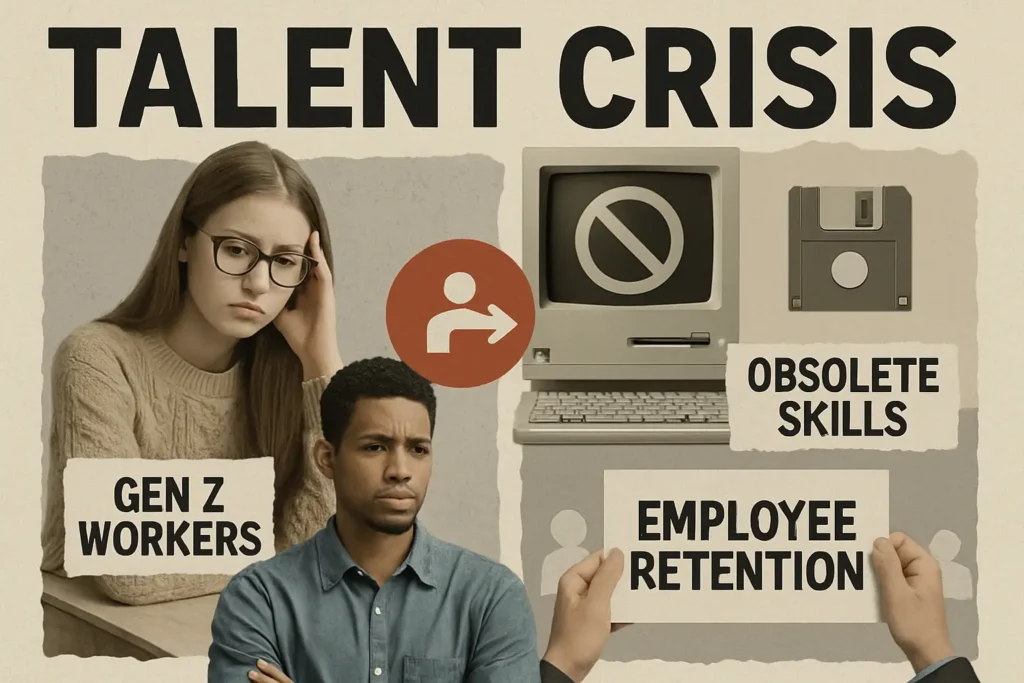
The technology sector faces an acute talent shortage across multiple disciplines:
Specialized Skills Shortage: Demand for AI engineers, cybersecurity professionals, and cloud architects far exceeds supply.
Remote Work Challenges: While remote work expanded talent pools, it also increased competition and created new management challenges.
Compensation Inflation: Salaries for tech professionals have risen dramatically, straining budgets and creating internal equity issues.
Cultural Fit: Finding candidates who align with company values and can adapt to rapidly changing technology environments remains difficult.
6. Data Infrastructure and Management
As data volumes continue expanding exponentially, organizations struggle with infrastructure scaling and management complexity. The proliferation of IoT devices, social media platforms, and digital business processes generates data at unprecedented rates, while organizations simultaneously demand real-time analytics and machine learning capabilities from this information.
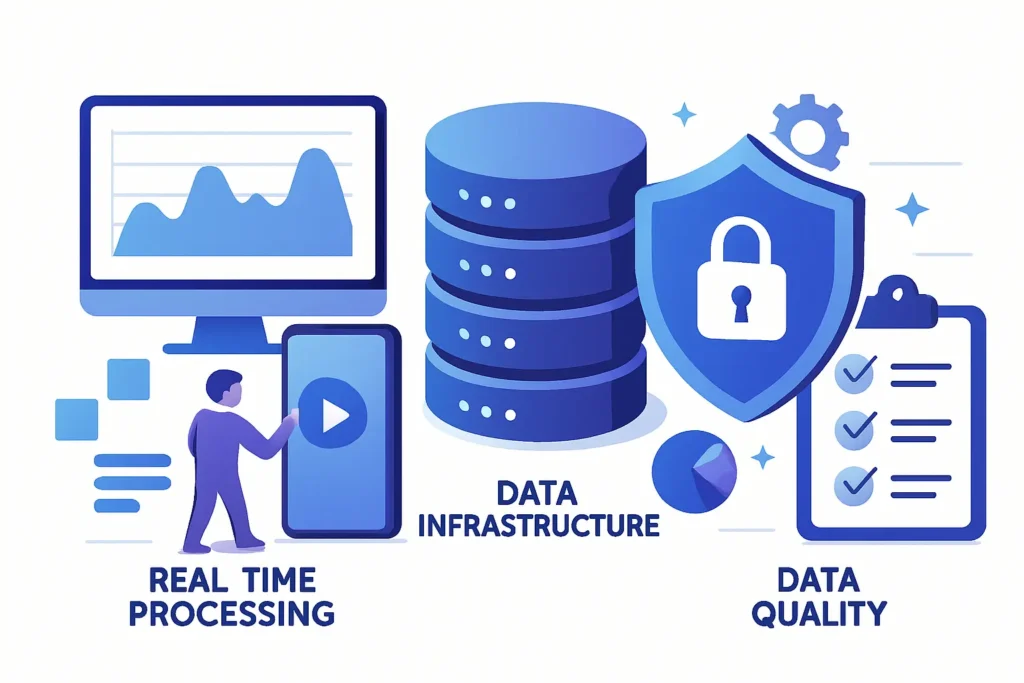
As data volumes continue expanding exponentially, organizations struggle with:
Scalability Issues: Existing infrastructure often cannot handle growing data loads efficiently.
Integration Complexity: Unique configurations, logs, and policy frameworks on each platform complicate consistent threat visibility across multi-cloud environments.
Data Governance: Ensuring data quality, security, and compliance across distributed systems becomes increasingly complex.
Storage Costs: Balancing storage needs with cost optimization requires sophisticated strategies.
7. Multi-Cloud Environment Complexity
Organizations increasingly adopt multi-cloud strategies, but this creates new challenges that many IT teams underestimate. While multi-cloud architectures provide vendor diversification, improved resilience, and cost optimization opportunities, they also introduce operational complexity that can overwhelm traditional IT management approaches.
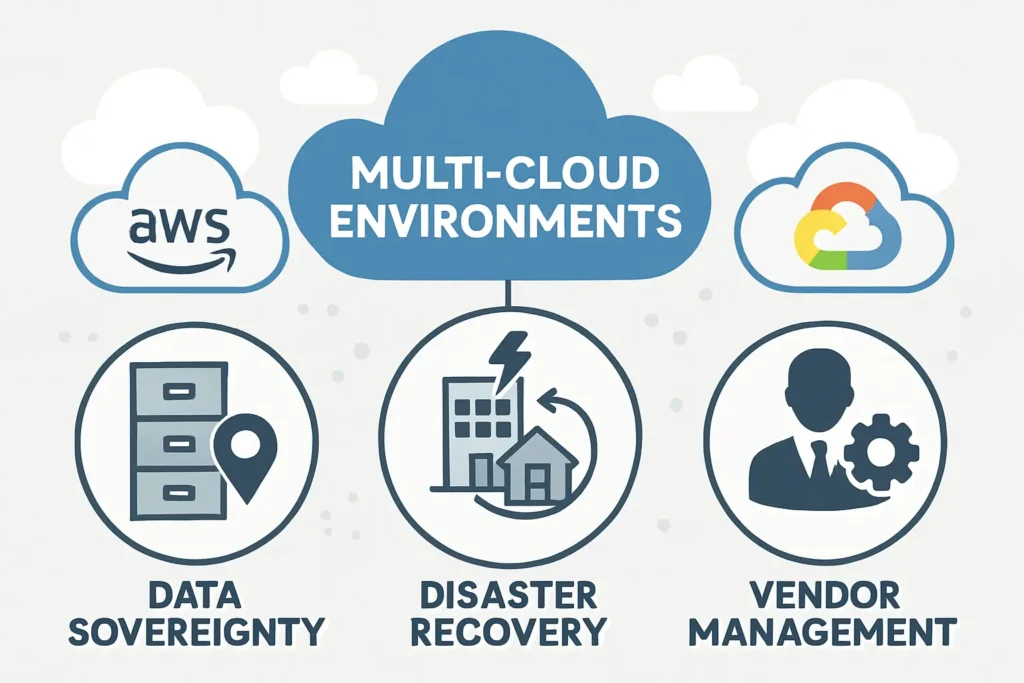
Organizations increasingly adopt multi-cloud strategies, but this creates new challenges:
Interoperability Issues: Ensuring seamless communication between different cloud platforms requires specialized expertise.
Cost Management: Tracking and optimizing costs across multiple cloud providers becomes complex.
Security Consistency: Maintaining uniform security standards across different platforms presents ongoing challenges.
Skill Requirements: Teams need expertise in multiple cloud platforms, increasing training and hiring demands.
8. Brand Differentiation in AI-Driven Markets
The challenge is making digital representatives stand out as the customer experience becomes more autonomous. Companies risk losing brand uniqueness as AI-powered customer interactions become more prevalent.
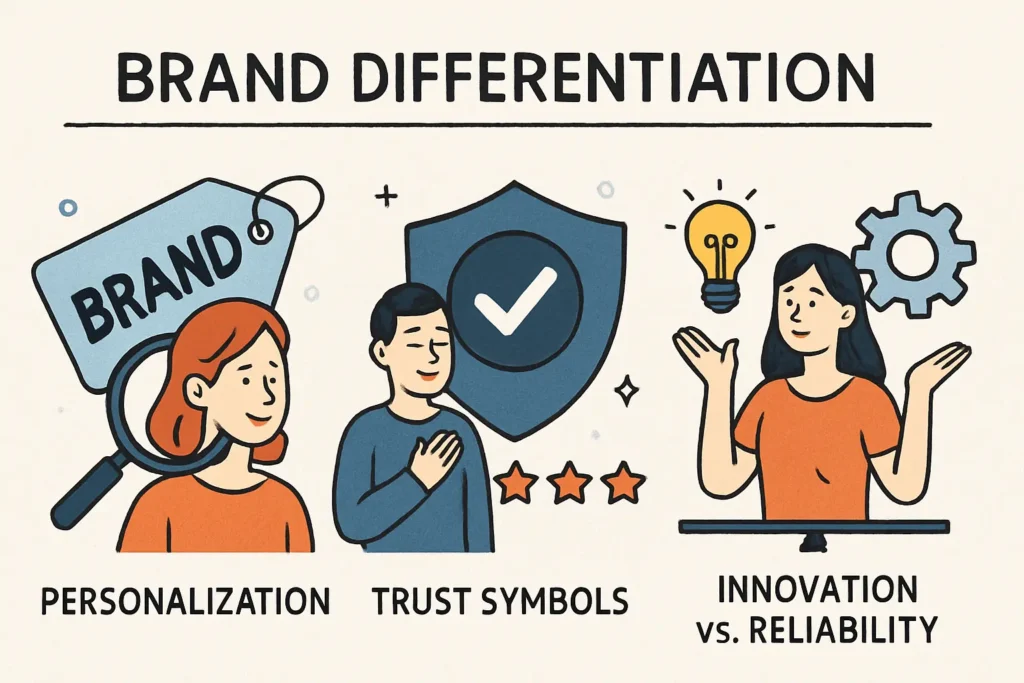
Key differentiation challenges include:
- Generic AI Interactions: Standard AI tools may dilute brand personality
- Customer Experience Automation: Balancing efficiency with personal touch
- Competitive Advantage: Standing out when everyone uses similar AI technologies
- Brand Voice Consistency: Maintaining authentic communication across AI-powered channels
9. Infrastructure Scaling and Energy Efficiency
The expansion of cloud computing, AI and data storage needs will drive significant investment in data centres in 2025. This growth creates several challenges that intersect technology advancement with environmental responsibility and operational sustainability.
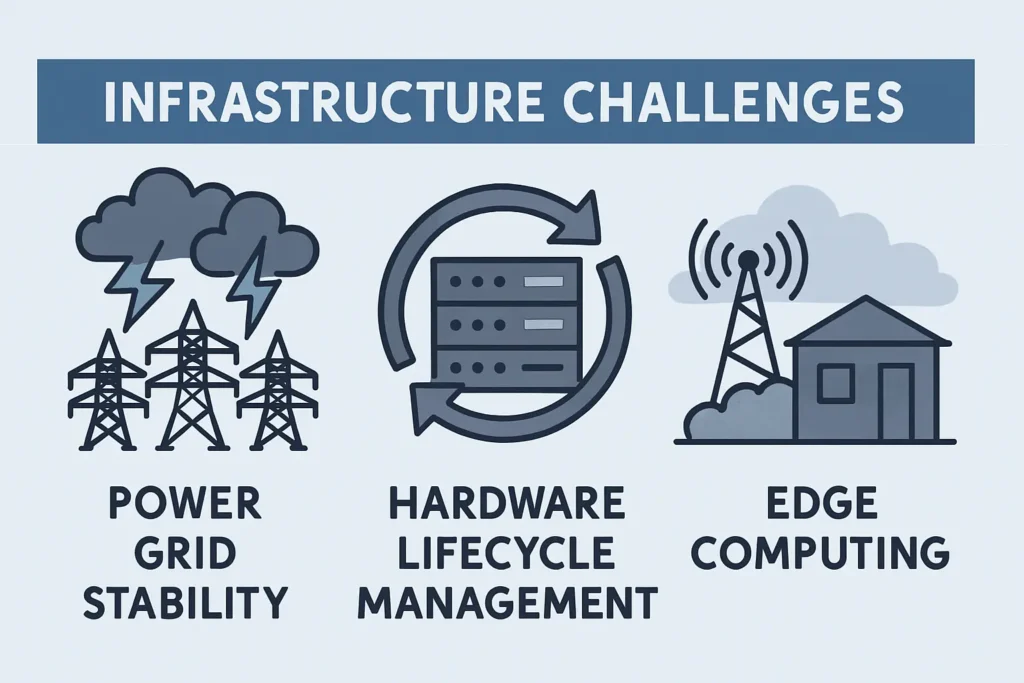
The expansion of cloud computing, AI and data storage needs will drive significant investment in data centres in 2025. This growth creates several challenges:
Energy Consumption: AI workloads require significant computational power, leading to increased energy usage and environmental concerns.
Cooling Requirements: Advanced processing generates substantial heat, requiring sophisticated cooling solutions.
Real Estate Constraints: Finding suitable locations for data centers becomes increasingly difficult in populated areas.
Sustainability Pressure: Balancing performance requirements with environmental responsibility.
10. Economic Uncertainty and Investment Challenges
Investments in tech trends cooled amidst inflationary pressures, reflecting broader economic uncertainties affecting the technology sector. The intersection of global economic volatility, changing interest rates, and shifting investor sentiment creates a challenging environment for technology companies seeking growth capital and strategic investments.
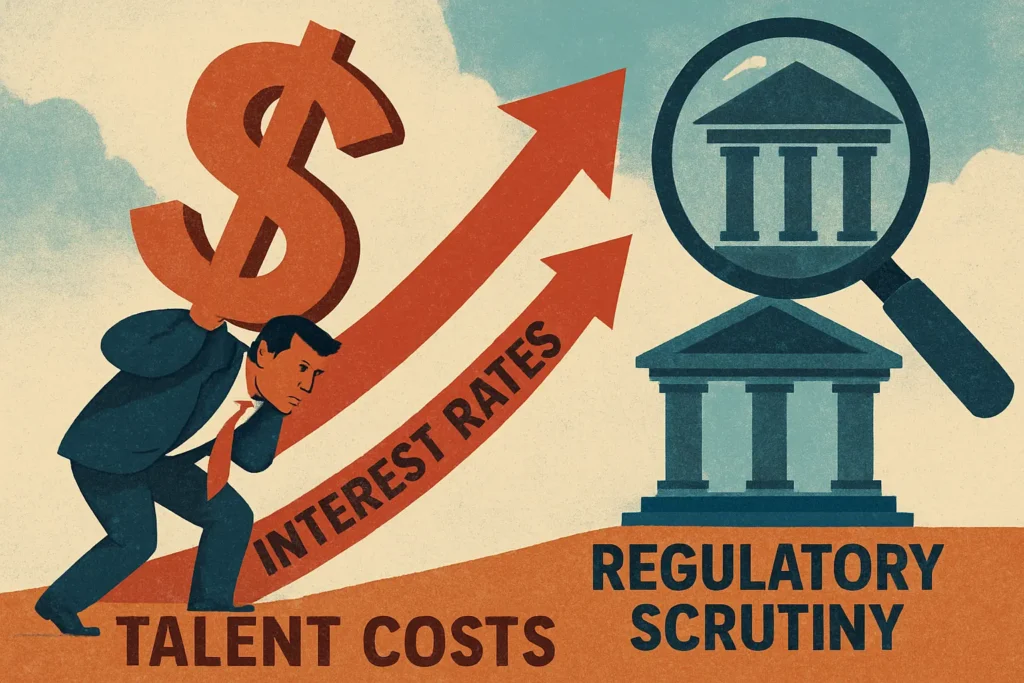
Investments in tech trends cooled amidst inflationary pressures, reflecting broader economic uncertainties affecting the technology sector:
Funding Constraints: Venture capital and investment funding have become more selective and conservative.
Valuation Pressures: Technology companies face pressure to demonstrate clear paths to profitability.
Market Volatility: Economic uncertainty affects long-term planning and strategic investments.
Customer Budget Constraints: Enterprise customers may delay technology purchases due to economic pressures.
Strategic Recommendations for Navigating 2025 Challenges
Immediate Actions
- Cybersecurity Investment: Prioritize security infrastructure and workforce development
- AI Governance: Implement clear AI usage policies and oversight mechanisms
- Supply Chain Diversification: Reduce dependency on single suppliers or regions
- Talent Development: Invest in upskilling existing workforce alongside external recruiting
Long-term Strategies
- Infrastructure Modernization: Plan for scalable, sustainable technology architecture
- Regulatory Compliance Framework: Develop adaptable compliance processes
- Brand Differentiation: Focus on unique value propositions beyond technology features
- Financial Resilience: Maintain strong cash positions and diversified revenue streams
Conclusion
The technology industry in 2025 faces unprecedented complexity across multiple dimensions. Success requires balancing innovation with security, growth with sustainability, and efficiency with human-centered values. Organizations that proactively address these challenges while maintaining strategic focus will be best positioned to thrive in this evolving landscape.
While “uncertainty” is likely to remain a watchword for 2025, companies that embrace adaptive strategies and invest in core capabilities will emerge stronger. The key lies in viewing these challenges not as obstacles but as opportunities to build more resilient, innovative, and sustainable technology organizations.
References and Further Reading
- McKinsey Technology Trends Outlook 2025
- Deloitte 2025 Technology Industry Outlook
- Gartner’s Top 10 Strategic Technology Trends for 2025
- SC Media: 2025 Cybersecurity Forecast
A big thank you for exploring TechsBucket! Your visit means a lot to us, and we’re grateful for your time on our platform. If you have any feedback or suggestions, we’d love to hear them.


